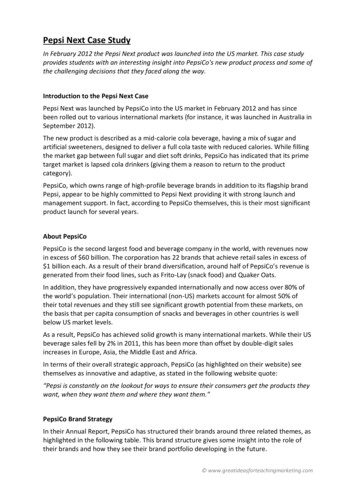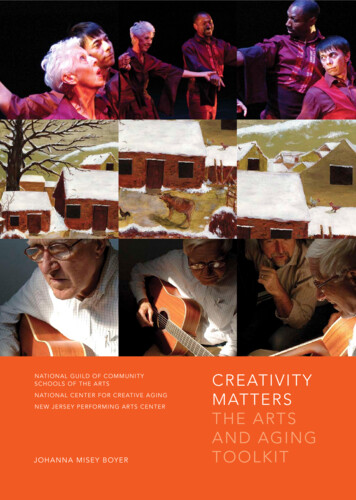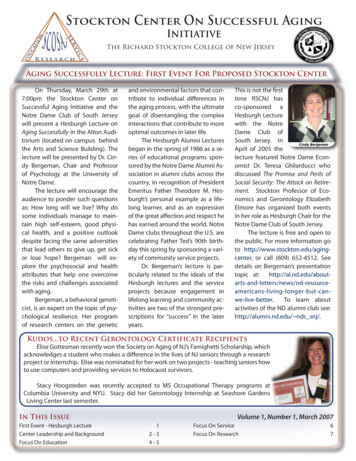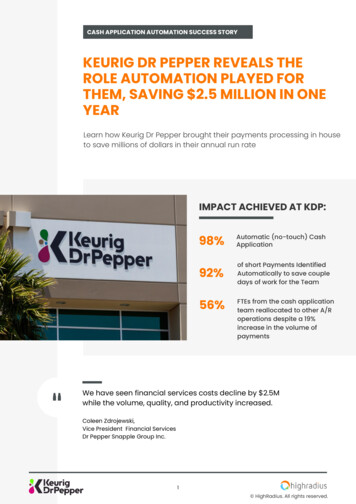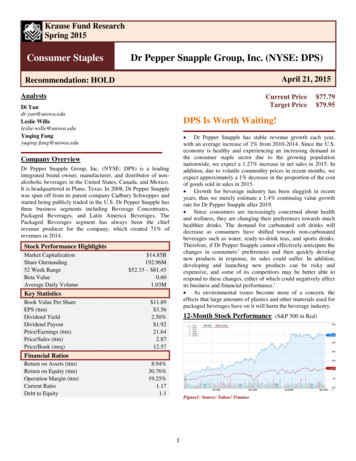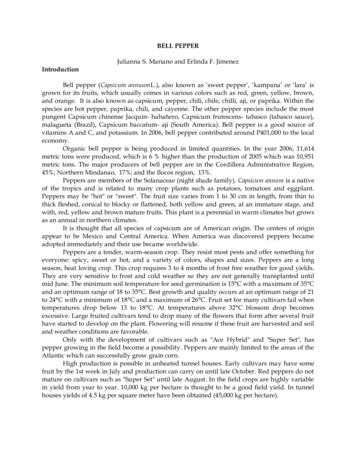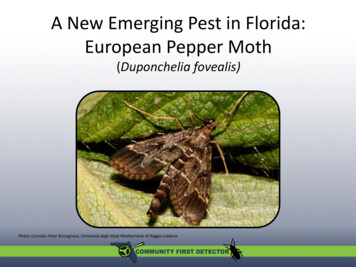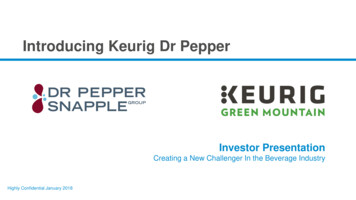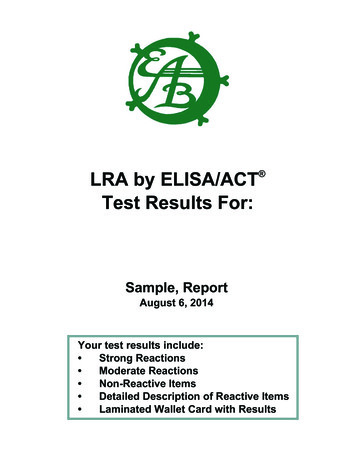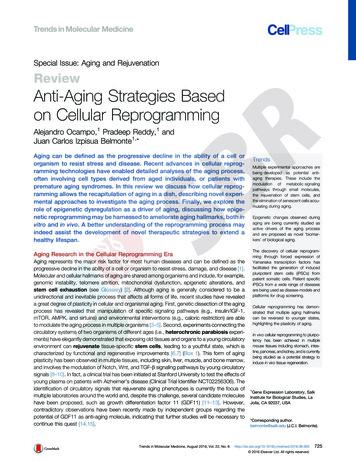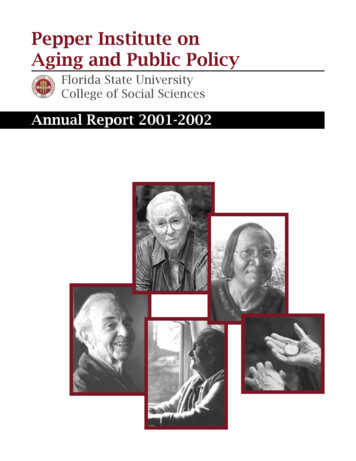
Transcription
Pepper Institute onAging and Public PolicyFlorida State UniversityCollege of Social SciencesAnnual Report 2001-2002
From the DirectorDear Friends,Having recently celebrated our silver anniversary as the hub of aging research onFSU’s campus, we have much to report. We completed and released the Florida’sAging Population, Critical Issues for Florida’s Future, 2002, co-funded by thePepper Foundation. The book is an almanac of facts and figures that describeFlorida relative to other key states and the nation. Our research program in longterm care continues to grow. Under the leadership of Jill Quadagno, the program was awarded a UniversityProgram Enhancement Grant of 100,000 to expand the research agenda to include assisted living facilities,the fastest growing sector of long-term care. In March of 2002, the Institute also sponsored a conferenceon long-term care, which was funded by the National Institute on Aging and the Robert Wood JohnsonFoundation. Neil Charness continues to build the Institute’s presence in the technology and aging arena,co-organizing an NIA-funded conference on the Impact of Technology on Successful Aging as well asthe bi-annual conference for the International Society for Gerontechnology in addition to his continuingparticipation in the CREATE research project.Our educational programs are also expanding, continuing to attract students who want to build expertise inaging studies. In addition to the graduate and undergraduate Certificate Programs, we now have a Master’sdegree in Aging Studies, which has admitted its first cohort of graduate students for fall, 2002. Our lifelonglearning program, The Academy at FSU, is also growing and offering great opportunities for mature adults tolearn about their favorite topics and enjoy the social aspects of education.The faculty Associates, Affiliates, Advisory committee members, Research Scientists, Professional and Officestaff, and students continue their hard work to build a better future for older Americans. This reportsummarizes recent accomplishments that have made the Pepper Institute a nationally and internationallyrecognized center of excellence in research, training, and education.Best regards,Melissa A. Hardy, Ph.D.Director and Bellamy Professor of SociologyAbout the Pepper Institute on Aging & Public PolicyThe Pepper Institute on Aging and Public Policyserves as coordinator and facilitator for themultidisciplinary work in aging issues at FloridaState University with an interest in aging issues.The resources of the Institute are used to supportindividual or collaborative research projects as wellas graduate training and other educational initiativescampus wide. Current research projects includework and retirement, pensions, inequality, long termcare, assisted living, technology and aging, dementiaand care-giving, education and achievement, wellbeing, life satisfaction, the impact of Alzheimer’son families and communities, intergenerationalrelations, Social Security and health and aging.The Institute administers the Master’s Degree inAging Studies and the Certificate in Aging StudiesProgram to ensure that interested students haveopportunities to earn the appropriate credentials topursue professional work in the field of aging.The Institute also sponsors an extensive outreachprogram for mature adults. The Academy at FSUencourages elders to return to campus to continueto learn, while participating in research projectsand intergenerational education at Florida StateUniversity.
Alzheimer’s InitiativeGift Honoring Dempsey Barron Kicks Offthe Pepper Institute Alzheimer’s InitiativeA check for 500,000, an anonymous giftadministered by the Office of the AttorneyGeneral of Florida, allowed the Pepper Instituteto begin work on the Barron Initiative toAdvance the Care and Quality of Life ofElder Floridians with Neurological Impairment.Clearly, developing methods of diagnoses,treatment and prevention are important goalsfor programs in the Alzheimer’s arena. Butit is also essential to provide up-to-dateinformation, assistance, advice and support topatients and caregivers who are already livingwith Alzheimer’s or some other form ofneurological disease.Medical research that helps us learn more aboutthe disease must be quickly translated intoknowledge and practices within the millionsof households where Alzheimer’s has intruded.Once the diagnosis is made, patients and theirfamilies are occupied with their attempts topreserve a stable living environment; they mayneither know nor understand the practicalimplications of research breakthroughs in bothbasic and applied fields. We must ensure theyreap the benefits of whatever we learn as quicklyas possible.The Pepper Institutecurrentlyconcentrates it’sefforts in threeareas — research onimprovingcommunication withAlzheimer’s patients;launching a publicinformationcampaign to helppeople betterunderstand thedisease and their options for care; and workingwith policymakers to improve the collectionand analysis ofdata on thesocial, economicand illnesstrajectories ofpatients andcaregivers. As Research Coordinator of the TallahasseeMemorial HealthCare Memory Disorder clinic,Dr. Michelle Bourgeois continues her researchto develop interventions that will improvecommunication abilities among older patientswith dementia; Jan Benesh, President of the Alzheimer’sResource Center of Tallahassee Board ofDirectors, has been developing a publiceducation initiative that will provide essentialinformation to families and patients who havejust learned “the diagnosis is Alzheimer’s;” During the past year, the Institute has hadmore than a dozen students working withAlzheimer’s patients and their caregiversthrough the Tallahassee Memorial Adult DayCare Center; Spring 2002, the Institute and the Alzheimer’sResource Center co-sponsored a caregivers’training seminar at FSU; Institute Associates have also taught coursesabout Alzheimer’s Disease, including one lastfall on the Physical and Psychosocial Aspectsof Alzheimer’s Disease.1
Highlights of 2001-2002Challenges in Nursing Home Care ConferenceIn March 2002, thePepper Institutepresented a nationalforum for thediscussion of thecomplex issue thatconfront theorganizations,governmentregulators, patientsand families whooperate in thecomplex arena ofnursing homes.Organized by Jill Quadagno and Debra Street,with the assistance of Sidney Stahl, Chief,Health Care Organizations & Social Institutions,National Institute on Aging, this conference,which was funded by grants from the NationalInstitute on Aging and the Robert Wood JohnsonFoundation, tackled some of the most difficultissues of long term care, including: Quality of care and the quality of life experienceby patients in nursing homes; Strategies for reimbursement and their impacton patients and the levels and types of carethey receive; Issues of organization and communication thatcan affect the quality of care provided topatients; and The need for better consumer information aboutthe care provided in nursing homes.Conference speakers were drawn from nationalexperts in nursing home research and includedJoshua Wiener (The Urban Institute), RosalieKane (University of Minnesota), LaurenceBranch (Duke University), MadonnaHarrington Meyer (Syracuse University),Pamela Larson (National Academy of SocialInsurance), David Mehr (University of Missouri),Jeanie Kayser-Jones and Charlene Harrington(University of California, San Francisco), DanaMukamel (University of Rochester), WilliamSpector (Agency for Healthcare Research andQuality), Sheryl Zimmerman (University ofNorth Carolina at Chapel Hill), Karl Pillemer(Cornell University), Vincent Mor and JoeAngelelli (Brown University) as well as facultyand students of the Pepper Institute on Aging,such as Jill Quadagno, Debra Street, LoriParham, Steve McDonald, Howard Tuch,Melissa Hardy, Gary Fournier, CharlesBarrilleaux, Patricia Martin, MichelleBourgeois, Katinka Dijkstra, and Ellen Hickey. End-of-life care within the nursing homecontext including the role of hospice;CREATE — The Center for Research and Education onAging and Technology EnhancementThat computer technology has changed the waywe work and the way we play has become clear,as employers, teachers, doctors, designers, andpublishers, to name a few, have tried to keeppace with this rapidly changing world of hardwareand software. Funded by the Institute on Aging,the CREATE project involves researchers fromUniversity of Miami (Sara J. Czaja and JosephSharit), Florida State University (Neil Charness)and Georgia Institute of Technology (Arthur2D. Fisk and Wendy Rogers) whose research isdesigned to address how people of older ageassimilate technology into their lives. Given agerelated changes in psychomotor and cognitiveskills, older users are often confronted with‘unfriendly’ design features of these newtechnologies. A major goal of this researchis to demonstrate how research findings canbe translated into guidelines for system designfeatures that are accessible to older users.
Highlights of 2001-2002Preparing for an Aging World:The Valencia ForumUnder the general auspices of the InternationalAssociation of Ageing, co-sponsored by theUnited Nations Population fund and withinvolvement of the World Health Organisation,Help Age International and hosted by the ValenciaAutonomous Region Government and the SpanishSociety for Gerontology and Geriatrics, theValencia Forum was convened April 1-4 2002.The purpose of the forum was to mobilizethe international research community to providescientific evidence base supporting the policydeliberations of the Second World Assembly onAgeing. Representatives from 160 countriesattended the conference to assist in prioritizingpolicy initiatives to address the challenges of anaging world. Professor Melissa Hardy served asChair of the Policy Group on Work, Retirementand Pensions. Reports generated from thisconference include the Valencia Forum Reportand the Research Agenda on Ageing for the21st Century, which can be found at http://www.valenciaforum.com.Florida’s Aging Population:Critical Issues for Florida’s Future, 2002No one doubts that the median age of thepopulation is increasing, especially those of uswho live in Florida which is home to largestpercentage of 65 and older residents in thenation. Not only does having more than 18% ofthe population aged 65 and older make Floridathe ‘oldest’ state in the US, it ranks Floridaat the top ofthe list of theworld’s oldestcountries: Italy(18.1%),Greece (17.3),Sweden(17.3%) andJapan (17.0)have the largestproportion ofresidents aged65 and older inthe world. TheUnited States does not rank among the top 25in this list, but among developed countries, theUS has one of the largest percentage increases inelderly expected by the year 2030. The fastestgrowth rates will occur in developing countries inAfrica, Asia, and South America.Because Florida is among the first areas tocomplete this demographic transition, Floridapolicy makers need to be creative in dealingwith critical issues of health, long-term care,income security, and housing for the elderly andresponsive to the needs of the elderly population.To gain a better understanding of the aging issuesFlorida will face in the next several decades,we produced a fact book on Florida’s agingpopulation. Using national statistics, statisticsfrom three more populous states, and statisticsfrom three of the ‘oldest’ states, this almanacprovides a wealth of useful information for policymakers. For more information on this resourcebook, see our website at www.pepperinstitute.org.3
Highlights of 2001-2002Program Enhancement GrantThe Program Enhancement Grant to establishthe Center for Long-Term Care Research wasawarded by the Florida State University ResearchFoundation Cornerstone Program.Long-term care is oftendescribed as rangingalong a continuum,from informal careprovided by family andfriends, to formal careprovided by homeJill Quadagno and Debra Streethealth agencies,assisted living facilities, and nursing homes. Yetmost research has focused on the specific forms oflong-term care in isolation, rather than identifyingand analyzing the linkages across care settings.Jill Quadagno, Debra Street, Michelle Bourgeoisand Anne Barrett received a 2002 ProgramEnhancement Grant (PEG) from the FloridaState University Research Foundation CornerstoneProgram to establish the multidisciplinary Centeron Long-Term Care Research at the PepperInstitute on Aging. The Center for Long-TermCare Research is developing a comprehensiveresearch program to explore the linkages amongdifferent types of long-term care arrangements,from home care to assisted living to nursing homecare.Currently, data on various components of theFlorida long term-care system are spread overnumerous agencies and organizations includingthe Department of Elder Affairs, the Agency forHealth Care Administration, the Department ofHealth and the Department of Insurance. Federaldata is also spread among various agencies.The PEG grant permits the research team topursue two aims. First, they are creating statelevel databases that link data from disparateagencies of the state and federal government.These datasets will be of broad interest tosocial gerontologists from a variety of disciplinarybackgrounds (including sociology, politicalscience, economics, public administration,epidemiology, and urban and regional planning).Second, the PEG grant provides the seed moneyrequired to build an interdisciplinary researchteam to implement a sustainable research programin long-term care and expand the PepperInstitute’s externally-funded long-term careresearch support.Determinants of Medicaid Nursing HomeUtilization in FloridaThe experiences of individuals and their families,organizational conditions, policy choices andpopulation change all play roles in predictingwho enters Florida nursing homes, and whopays for their care when they do. Fundedby the Florida Agency for Health CareAdministration, Jill Quadagno, Debra Street andMelissa Hardy analyzed how different nursinghome organizational types, competing institutions,and public policies (particularly federal Medicareand state Medicaid policies) influenced ratesof Medicaid nursing home utilization between1989 and 1998. The rate of growth in Florida’sMedicaid nursing home utilization slowed over4the decade and was affected by several factors.Growth in the assisted living industry madeappropriate alternative care available for somefrail elders. More generous reimbursement underMedicare for skilled nursing care encouragednursing homes to seek Medicare versus Medicaidadmissions. State long-term care policies,including increased nursing home pre-admissionscreening and an array of state and Medicaiddiversion projects helped frail elders avoid nursinghome placement, also contributing to the slowedrate of growth in Medicaid nursing homeutilization. For more information on the finalreport, see our website at www.pepperinstitute.org.
Highlights of 2001-2002Feasibility Analysis of the AssistedLiving Training ProgramFlorida’s long-term care expenditures representa large and growing component of the Statebudget every year, as the number of elders inFlorida increases. The State is also responsiblefor licensure and regulation of residential facilitiesto ensure that quality of care for residentsis adequate. Under current law, operators ofAssisted Living Facilities (ALFs) and AdultFamily Care Homes (AFCHs) must be trainedunder the Assisted Living Training Program(ALTP) operated by the Department of ElderAffairs in order to be licensed by the state.Program Consultants for the DOEA currentlyprovide training to ALF and AFCH providers inthe eleven Planning and Service Areas of the state.In the context of growing fiscal obligations to payfor long-term care and concerns about quality ofcare, the state is seeking to balance the need tofinance and regulate long-term care with potentialcost-savings or quality of care improvements thatmay accrue from privatizing some services.Jill Quadagno and Debra Street (Pepper Instituteon Aging) and Patricia Yancey Martin(Department of Sociology) received a contractfrom the Department of Elder Affairs to conductan evaluation and feasibility analysis of whetherthe ALTP should be privatized. The purpose of theresearch is to describe the scope and complexityof the ALTP, to provide objective informationabout potential alternatives to Department of ElderAffairs ALTP provision, and to assess the costs/benefits of identified privatization alternatives.The Problem of Attrition Bias in Panel Studies of AgingTo answer many research questions in the area ofaging and the life course, we turn to longitudinaldata, or information collected over time. Toconstruct information on personal histories, weneed to have information on the same people foran extended period of time. Various longitudinaldata sets exist and in some cases, the same sampleof respondents has been interviewed for morethan 30 years. Of course, after 30 years ofdata collection, not all of the original respondentsare still available for interview. In some cases,respondents have died; in other cases, respondentsfatigue of the interview process and refuse tocontinue; in still other cases, respondents movefrom one location to another, and the project staffare unable to locate them. All three of these typesof non-response are called “sample attrition.”In his research, John Reynolds, AssistantProfessor of Sociology and Research Associateof the Pepper Institute places the question ofattrition bias at center stage. In a studyfunded by the National Institute on Aging,he will work with variouslongitudinal data sets toassess the impact of sampleattrition on estimates of agespecific changes in physicalhealth in late adulthood. ForJohn Reynolds andthose who study health ingraduate student,aging populations, the lossKathy Heymanof research subjects isparticularly troubling because attrition is mostcommon among older adults with the poorestmental and physical health. By comparingestimates based on longitudinal data (correctedfor attrition bias) to estimates for the generalU.S. population, he hopes to develop a ‘tolerancemodel’ that researchers can use to adjust theirestimates and thereby account for the bias causedby attrition. This model factors in the assumptionthat subjects will continue to participate in aresearch study only to the extent that their declinesin health are tolerable. Once developed andtested, he will make his statistical subroutineavailable through standard analysis packages.5
Educational ProgramsMaster’s Degree in Aging StudiesThe Master’s Degree in Aging Studies at FloridaState University will help meet the demand forexperts with multidisciplinary training in agingissues. Master’s students will develop skills inpolicy research and development and in programadministration andevaluation, withspecial emphasis onour agingpopulation. Theprogram fosters anunderstanding of thecomplexity of agingissues and theeffects of agingpolicy on the healthand welfare ofpeople of all ages inour society.This new degree program, offered through theCollege of Social Sciences, integrates thestrengths of various discipline perspectives toprovide a multidisciplinary approach to the studyof aging. Because of the wide array of careeropportunities, students may choose between twotracks: Research, Policy, and Evaluation orAdministration in Aging.The first cohort of students was admitted forthe Fall Semester 2002, and we are currentlyrecruiting our next cohort of scholars who want to6build their careers in the field of aging. A programof limited financial assistance has been establishedto help support deserving students.Students completing the curriculum of theMaster’s Degree in Aging Studies will be able to: Analyze public policy involving dynamics ofaging and longevity, Evaluate program delivery systems in terms ofaccess, quality and availability, Direct and manage organizations and programsfor the elderly, Evaluate program effectiveness, Collect and analyze research data, Link research findings to policyrecommendation, Understandthesocial, economicand political forcesthat have shapedpolicy and servicesfor the elderly, and Assessprogramfunctioning relativeto population aging.Graduates of the Master’s Degree in AgingStudies will assume leadership positions inresearch, administration, planning,implementation and evaluation of programsdesigned to improve the lives of older adultsand their families. Special opportunities existfor study in a wide range of areas including:pension and income security; health policy; accessto health care and health care financing; socialwelfare and social security reform; end-of-lifeissues; aging and social policy and successfulaging.
Educational ProgramsCertificate in Aging StudiesThe Certificate inAging Studiesprovides aneducationalcredentialdocumenting theadditional trainingand experience thestudent hasreceived in thefield of aging. TheCertificate may beawarded at thegraduate or theundergraduatelevel and is recorded on the official universitytranscript. Working professionals can earn theCertificate by enrolling in the university as specialstudents. Whether the area is health care, longterm care or adult day care; product design,medical research or nutrition; law education orreal estate; recreation, finance or governmentservice, our aging population will create bothchallenges and opportunities for students buildingcareers in tomorrow’s labor market. The PepperInstitute administers and awards the Certificate onbehalf of the Florida State University College ofSocial Science.To earn the Certificate inAging Studies, students mustcomplete a total of twelvecredits and satisfyrequirements in bothcoursework and aninternship working in thecommunity with an agencyserving older adults.During the 2001-2002students contributed 2,650hours of community serviceto agencies serving theelderly. These serviceswere provided in Miami,Orlando, Tampa, Tallahassee and the surroundingarea, Chattahoochee, and Thomasville, GA.The Agencies served by Certificate studentsinclude:Alzheimer’s Project of TallahasseeAlzheimer’s Resource CenterArbors Assisted Living CenterBig Bend HospiceClare Bridge Assisted Living CenterElder Care ServicesFlorida Department of Elder AffairsTallahassee Memorial Adult Day Care CenterTallahassee Senior Citizens CenterWestminister OaksWoodmont Retirement CommunityChattahoochee HospitalThomasville HospitalThe Veterans Hospital in MiamiThe Tampa Senior Citizens CenterA total of 84 students were enrolled in theCertificate Program during the 2001-2002academic year. Twenty-four students earned theirCertificates. Students earning the Certificatein Aging Studies were from five colleges and11 departments throughout the university.Professionals already employed or seekingemployment in the aging network also enrolled inand earned their Certificate as special students.Certificate Students’ Majors7
OutreachThe Academy at FSURapid growth of an increasingly healthy and welleducated elder population has raised the demandfor programs that allow adults to continue tolearn. At Florida State University, opportunitiesfor lifelong learning are provided by the PepperInstitute through The Academy at FSU, theprogram for mature adults. This program isencourages intellectual curiosity, validatesindividual achievement, utilizes leadershipqualities, enhances research opportunities andpromotes intergeneration communication betweenelders and traditional college-aged students.The Academy at FSUoffers a wide spectrumof classes, fromanthropology tozoology. Deans,department chairs,new faculty andmembers of the Academy all contribute byteaching classes. Student interns assist withprogram operations; faculty and doctorialcandidates recruit members for research projects;and academy members participate on boardsand advisory committees within the traditionalboundaries of the academic community. Theprogram is financed through membership duesand is self-supporting. The rewards are many,including the promotion of intergenerationalunderstanding; opportunities for faculty to teachspecial interest courses; utilization of academymember’s extensive experience and education;and unique experiences for students interested inAging Studies.The Academy Program offers academic classes,brown bag lunch lectures, field trips, an art andculture group, a book club, a dulcimer group,fitness activities and special event celebrations.The heart of the program is the six-weeks ofacademic classes offered each fall and springsemester.8During the 2001-2002 academic year theAcademy at FSU offered the following academicclasses:Fall 2001 Mission San Luis Archaeology and History(On Site) Sex, Sexuality and Culture in the Ancient World Americans in Paris (American Writers Who Livedor Loved to Travel in Europe) Nutrition, Vitamins, and Supplements All About the Production of a Film American PresidentsSpring 2002 Richard Rodgers’ Musicals Keeping your Balance in Life Meteorology Science and Religion: Conflict or Connection? World Famous Cities The Nature of Memory
Awards, Honors and RecognitionsNeil H. Charness, Ph.D.Nominated for the position of editor of Psychology andAging, APA’s journal on aging.Scientific Foundation Ireland: Reviewed two grantproposals for the ICT program.Review of Telemedicine proposal for CarillonResearch and Education Center.Review of Natural Sciences and Engineering ResearchCouncil of Canada grant proposalReviews for Human Factors and Ergonomics Societyprogram submissions.NIH Grant consultation for Suzanne Ebbers, LSIPaid Consultant, 3-M Lead User Workshop onTelemedicine, St. Paul, MN July 19-21.Gary M. Fournier, Ph.D.Invited Lecture: “An Economist’s Views on RisingHealth Care Costs”, for the FSU chapter of theAmerican Medical Women’s Association, Tallahassee,February 26, 2002.Melissa A. Hardy, Ph.D.Bellamy Distinguished Professor of Sociology, 2001.Elected to the Council of the American SociologicalAssociation’s Section on Methodology, 2002-2005.Inducted into Phi Kappa Phi, 2002.Appointed to the National Research Council’sCommittee on Adaptive Aging, 2002.Chair, “Work, Retirement and Pensions” Policy Groupfor the Valencia Forum, 2002.Channel 6 2/6/01, Kathleen Bell, FSU Headlines,television interview 3/6/01Served as a member of the Study Section in HealthSystems Research for Agency for Health QualityResearch.Interview with MSN Encarta reporter (Jeanne Sather)on chess expertise 5/2/01: esign Committee for the National LongitudinalSurveys, Bureau of Labor Statistics, 2001-2002.Interview with Graeme Burnet, Northlight TVProductions in Glasgow, Scotland, 5/9/01 on chessexpertise.International Scientific Advisory Committee,Gerontechnology 2002: Creative Use of Technologyfor BetterAging, International Society forGerontechnologyMarie Cowart, Ph.D., DeanInducted into Phi Kappa Phi, 2002.Member of the Board of the Southern GerontologicalSociety.Prepared an invited paper on Substance Abuse and theElderly for the American Academy of Nursing,In July, 2002, Dean Cowart, on behalf of PresidentD’Alemberte, awarded 18 FSU baccalaureate degreesto students graduating from our campus in PanamaCity, Panama.Gerald R. Ferris, Ph.D.Recipient of the Alumnus of the Year Award,Department of Psychology, Illinois State University,Normal, Illinois, 2001.Scientific Advisory Committee, CREATE (Center forResearch and Education on Aging and TechnologyEnhancement). Funded by National Institute on Aging,1999-2004.Jill Quadagno, Ph.D.2001-2002 Alumni Distinguished Achievement Award,University of Kansas College of Liberal Arts andSciences.Tonya Toole, Ph.D.2001 AAHPERD, Research Consortium, ResearchWriting Award, for an outstanding paper publishedin Research Quarterly for Exercise and Sport, 2000,Volume 71, Authors: Wulf, Gabriele, McNevin,Nancy, Fuchs, Thomas, Ritter, Florian, Toole, Tonya.Recipient of the Herbert G. Heneman Jr. Awardfor Career Achievement, Human Resource Division,Academy of Management, 2001.9
Awarded Contracts and GrantsMelissa A. Hardy, Ph.D.Pepper Foundation, “Florida’s Aging Population:Critical Issue for Florida’s Future.” 60,000. April2001 to May 2002.Marie Cowart, Ph.D.“Chronic Disease Epidemiology Support.” Contractwith the Florida Department of Health, Marie Cowart,Principal Investigator and William Serow, Co-PrincipalInvestigator. Project funding 2000-2002. 2,504,488.27.“Clean Indoor Air Act.” Contract with the FloridaDepartment of Health, Marie Cowart, PrincipalInvestigator and William Serow Co-PrincipalInvestigator. Project funding 2001-2002. 53,000.00.Jill Quadagno, Ph.D.“The Center for Long Term Care Research.” PI(with Debra Street, Michelle Bourgeois, Ann Barrett).Program Enhancement Grant, Cornerstone Program,FSU, Aug,1, 2002 - July 30, 2004. 99,928.“Challenges in Nursing Home Care.” PI (with DebraStreet). National Institute on Aging. February 1, 2002Jan. 31, 2002. 47,233.Challenges in Nursing Home Care. PI (with DebraStreet). Robert Wood Johnson Foundation, July,2001-June, 2002. 20,000.Investigator Award in Health Policy Research. PIRobert Wood Johnson Foundation, May, 2000-June,2003. 246,640.“Determinants of Medicaid Nursing Home Utilizationin Florida.” PI (with Debra Street and Melissa Hardy).Florida Agency for Health Care Administration, Jan,2001- June 30, 2002. 99,033.“Feasibility Analysis of the Assisted Living TrainingProgram.” PI (with Debra Street and PatriciaMartin). Florida Department of Elder Affairs, May 1,2002-Sept. 30, 2002. 52,000.Michelle S. Bourgeois, Ph.D.2001-03 Irvine (PI), Bourgeois (Co-PI), Care for theAged: A multimedia Staff Development Program, R44AG144940-02, NIA1999-02 Camp (PI), Bourgeois (Co-PI), SpacedRetrieval: Intervention for Cognitive Impairment, 1R01 NR04710-01, NIA1998-02 Bourgeois (PI), Memory Disorder Clinic,Contract XZ811, State of FloridaNeil H. Charness, Ph.D.National Institutes of Health/National Inst
the care provided in nursing homes. Conference speakers were drawn from national experts in nursing home research and included Joshua Wiener (The Urban Institute), Rosalie Kane (University of Minnesota), Laurence Branch (Duke University), Madonna Harrington Meyer (Syracuse University), Pamela Larson (National Academy of Social
